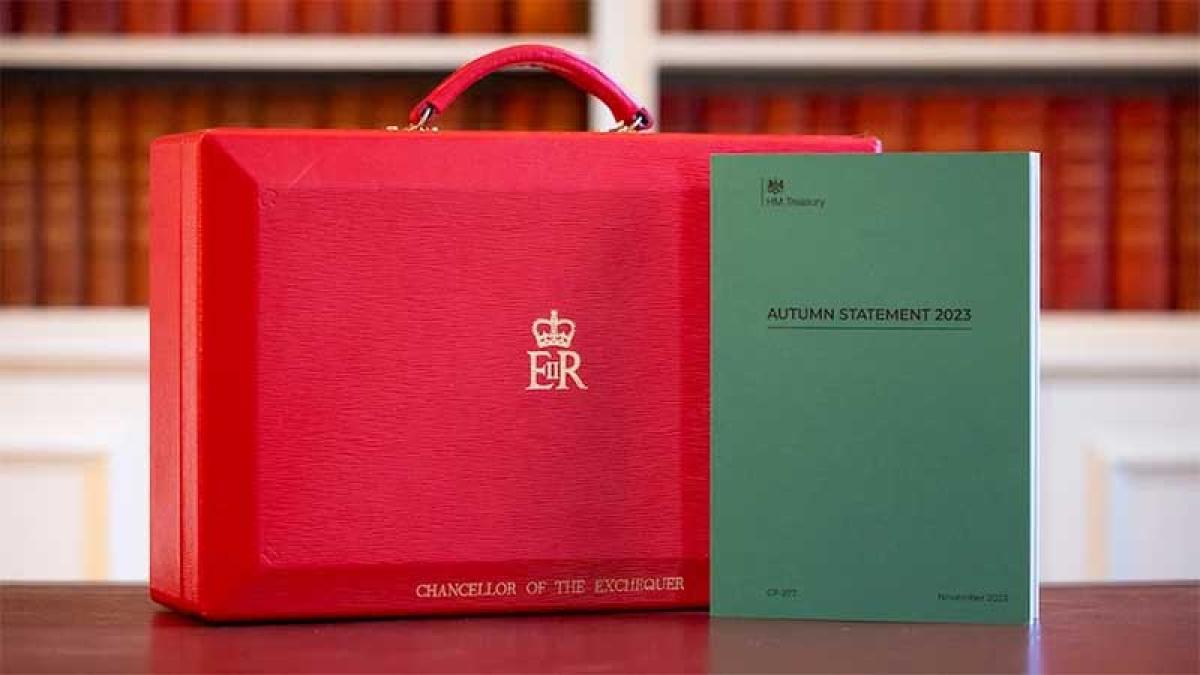Autumn Statement 2023

How does the Autumn Statement 2023 affect Northern Ireland businesses?
The Chancellor, Jeremy Hunt, delivered his Autumn Statement on Wednesday 22 November 2023. We have summarised the key points from the Autumn Budget and specific issues affecting Northern Ireland businesses.
Forecasts
Growth forecast
- 0.6% in 2023
- 0.7% in 2024
- 1.4% in 2025
- 1.9% in 2026
- 2% in 2027
- 1.7% in 2028
Debt Forecast
- 89.0% of GDP in 2023-24
- 91.6% of GDP in 2024-25
- 92.7% of GDP in 2025-26
- 93.2% of GDP in 2026-27
- 93.2% of GDP in 2027-28
- 92.8% of GDP in 2028-29
Northern Ireland-specific announcements
The Northern Ireland Executive will receive an additional £185 million in funding through the Barnett formula over 2023-24 and 2024-25.
Minimum wage
The National Living Wage, which currently applies to people over 23 years old, will be expanded to include those aged 21 years old and above from 1 April 2024.
The National Living Wage will increase from £10.42 to £11.44 an hour from 1 April 2024. The other National Minimum Wage rates will also increase, from 1 April 2024, as follows:
- Increasing the rate for 18-20 year olds by 14.8% to £8.60 an hour;
- Increasing the rate for 16-17 year olds by 21.2% to £6.40 an hour;
- Increasing the apprentice rate by 21.2% to £6.40 an hour; and
- Increasing the accommodation offset rate by 9.8% to £9.99 an hour
See minimum wage rates increase from 1 April 2024.
National insurance
From 6 January 2024, the employee National Insurance Contributions will drop from 12% to 10%.
Self-employed and National Insurance
Class 2 National Insurance Contributions paid by the self-employed will be abolished from 6 April 2024. Class 4 National Insurance Contributions will be cut by one percentage point from 9% to 8% from 6 April 2024.
VAT
The 0% rate of VAT will be expanded on women's period products to include period underwear from 1 January 2024.
Transport
Road tax for Heavy Goods Vehicles (HGVs) is frozen. The HGV Levy is frozen for 2024-25.
The government will maintain the Van Benefit Charge and the Car & Van Fuel Benefit Charges at 2023-24 levels for 2024-25.
Alcohol Duty
Alcohol Duty is frozen until 1 August 2024. The government will also delay its annual uprating decision to Spring Budget 2024 to give businesses time to adapt to the duty system introduced on 1 August 2023.
Tobacco Duty
The duty rates on all tobacco products will increase by RPI +2%. To reduce the gap with cigarette duty, the rate on hand-rolling tobacco will increase by RPI +12% this year. These changes will take effect from 6pm on Wednesday 22 November 2023.
Gaming Duty
The Gross Gaming Yield bandings for gaming duty will be frozen from 1 April 2024 until 31 March 2025.
Capital allowances
Full expensing will be made permanent so that investments made by companies in qualifying plant and machinery, after 1 April 2026, will continue to qualify for a 100% first-year allowance for main rate assets, and a 50% first-year allowance for special rate assets.
Income tax cash basis
The government is expanding and simplifying the income tax cash basis for the self-employed and partnerships. These changes will take effect from 6 April 2024 for 2024-25.
Manufacturing
Funding of £4.5 billion will be made available starting in 2025-26 lasting for five years for eight manufacturing sub-sectors: automotive (particularly zero-emission vehicles, their batteries, and supply chains), aerospace, life sciences, and clean energy (carbon capture, utilisation and storage, electricity networks, hydrogen, nuclear and offshore wind).
Innovation
The government will invest £145 million through Innovate UK to support business innovation. This includes £20 million for productivity and decarbonisation of foundation industries, £50 million for battery innovation, £50 million for investment in Catapults, and £25 million for innovation in critical technologies.
Research and development
The existing Research and Development Expenditure (RDEC) and SME schemes will be merged, with expenditure incurred in accounting periods beginning on or after 1 April 2024 to be claimed in the merged scheme.
The intensity threshold in the additional support for R&D intensive loss-making SMEs will be reduced from 40% to 30%. The government will also introduce a one year grace period, so that companies that dip under the 30% qualifying R&D expenditure threshold will continue to receive relief for one year. Businesses will be able to claim for expenditure incurred from 1 April 2023 once the Autumn Finance Bill 2023 has received Royal Assent, with the reduction in intensity threshold and grace period coming into effect for accounting periods beginning on or after 1 April 2024.
From 1 April 2024, R&D claimants will no longer be able to nominate a third-party payee for R&D tax credit payments, subject to limited exceptions. In addition, no new assignments of R&D tax credits will be possible from 22 November 2023. This means that in most circumstances payments of R&D tax reliefs will be paid directly to the company that claims for the R&D, ensuring they have full oversight of the claim, and receive payment more quickly
Stamp duty
The government is extending the Growth Market Exemption, a relief from Stamp Duty and Stamp Duty Reserve Tax (SDRT), to include smaller, innovative growth markets. It will also increase the threshold for the market capitalisation condition that is used within the exemption from £170 million to £450 million. These changes will be included in the Autumn Finance Bill 2023 for implementation from 1 January 2024.
Pensions
The state pension will increase by 8.5% from April 2024 to £221.20 a week.
Read full details on the Autumn Statement 2023.
First published 22 November 2023